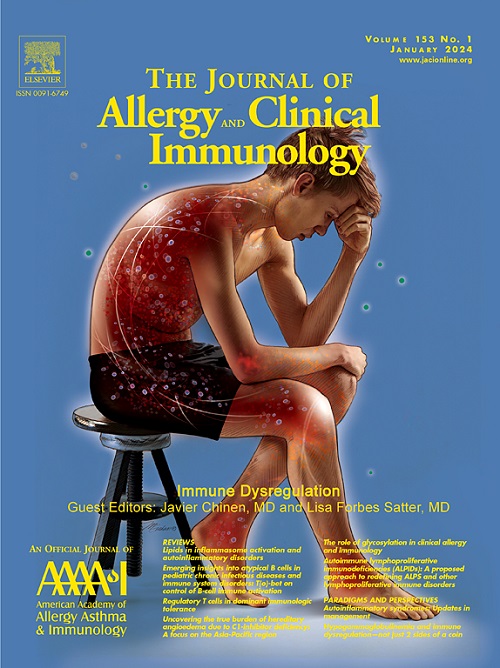哮喘的个体化治疗方法。
IF 11.2
1区 医学
Q1 ALLERGY
引用次数: 0
摘要
宿主易感性和环境暴露的差异导致哮喘的临床表现、自然进化和对治疗的反应存在显著的异质性。这些差异受到许多因素的影响,包括基因组学、表观基因组学、转录组学、蛋白质组学和代谢组学,其中许多因素受到环境和过敏暴露的影响。哮喘发展和进展中相互作用的复杂和多重特征对个性化管理提出了重大挑战。本综述旨在通过回顾发展这种治疗模式的每个重要组成部分,并通过提供精确或个性化哮喘药物的几个综合目标,指导临床医生进行管理决策。从基因组学、暴露反应和过敏反应等方面讨论了哮喘的生物学特征。进一步的见解包括靶向生物制剂和过敏原免疫治疗的使用,同时讨论了靶向上皮、粘液产生、气道平滑肌和小气道的重要性。我们研究了多变量聚类分析作为一种新范式的价值,它可以为治疗决策提供信息,并研究了适应性试验设计的潜力,以评估已知和新的预测性生物标志物并表征疾病异质性。本文章由计算机程序翻译,如有差异,请以英文原文为准。
Personalized therapeutic approaches for asthma
Differences in host susceptibility and environmental exposures result in significant heterogeneity in asthma clinical expression, natural evolution, and response to treatment. These differences are influenced by many factors including genomics, epigenomics, transcriptomics, proteomics, and metabolomics, many of which are modified by environmental and allergic exposures. The complex and multiple characteristics that interact in asthma development and progression pose significant challenges for personalized management. This review aims to guide the clinician in its management decisions by reviewing each of the components important in developing this therapeutic paradigm and by providing several integrated goals for precision or personalized medicine for asthma. Biologic characteristics of asthma in relation to the genomics, exposome, and hypersensitivity reactions (allergic responsiveness) resulting in asthma diathesis are discussed. Further insights including the use of targeted biologics and allergen immunotherapy are provided, while discussing the importance of targeting the epithelium, mucus production, airway smooth muscle, and small airways. We examine the value of multivariate cluster analyses as a new paradigm that can inform treatment decisions and the potential of adaptive trial design to evaluate known and novel predictive biomarkers and characterize disease heterogeneity.
求助全文
通过发布文献求助,成功后即可免费获取论文全文。
去求助
来源期刊
CiteScore
25.90
自引率
7.70%
发文量
1302
审稿时长
38 days
期刊介绍:
The Journal of Allergy and Clinical Immunology is a prestigious publication that features groundbreaking research in the fields of Allergy, Asthma, and Immunology. This influential journal publishes high-impact research papers that explore various topics, including asthma, food allergy, allergic rhinitis, atopic dermatitis, primary immune deficiencies, occupational and environmental allergy, and other allergic and immunologic diseases. The articles not only report on clinical trials and mechanistic studies but also provide insights into novel therapies, underlying mechanisms, and important discoveries that contribute to our understanding of these diseases. By sharing this valuable information, the journal aims to enhance the diagnosis and management of patients in the future.

 求助内容:
求助内容: 应助结果提醒方式:
应助结果提醒方式:


